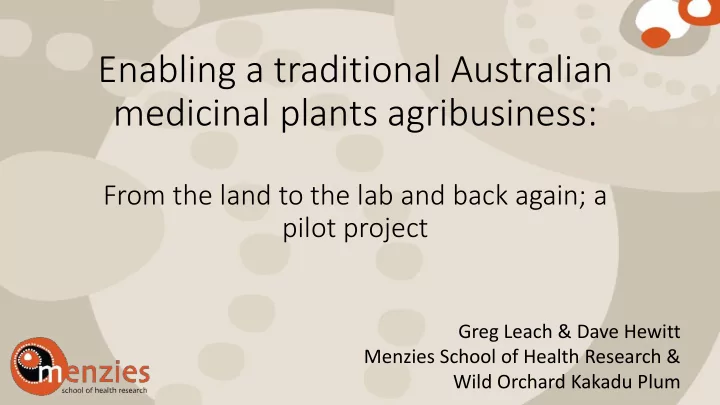

Enabling a traditional Australian medicinal plants agribusiness: From the land to the lab and back again; a pilot project Greg Leach & Dave Hewitt Menzies School of Health Research & Wild Orchard Kakadu Plum
About the Traditional Medicinal Plants Project • Industry-Research-Indigenous Enterprise collaboration • Development of sustainable, on-country agribusiness based around native plants traditionally used for medicine • 18 month pilot project funded by the Cooperative Research Centre for Developing Northern Australia (CRC-NA)
Project Origins
Project Context • Significant global market for natural medicines & health products - US$83 billion pa • Good reputation of Australian natural health care products • Absence of products informed by Australian Indigenous Traditional Knowledge • Lessons from Bush Foods industry
Complementary Medicines Regulated in Australia as medicines under the Therapeutic Goods Act 1989, complementary medicines include: • vitamins, mineral and nutritional supplements, homeopathic products, aromatherapy products and herbal medicines. • The term ‘complementary medicines’ also comprises traditional medicines, which includes traditional Chinese medicines, Ayurvedic, Australian Indigenous and Western herbal medicines. • $5.2 billion industry in Australia
Complementary Medicines – export market • Australia has created a $1 billion export success story as consumer demand continues to grow for high quality Australian complementary medicines. Official exports of Complementary Medicines has trebled in the last year. • 70% to China and Hong Kong • Australia has become the largest source of Nutrition and Health Food Imports to China - significantly outcompeting the USA and Germany. • China represents a significant growth opportunity for the Australian industry potentially doubling in size in 3 years
Project Aims • Profile chemical, antimicrobial & anti-inflammatory properties of some native Australian traditional medicinal plants • Engage Indigenous trainees and students in laboratory based research • Develop prototype complementary healthcare products • Assess suitability for harvest on-country • Recognise Traditional Knowledge in Intellectual Property management • Develop models for intellectual property management & benefit sharing
Project Partners & Project Governance Indigenous Reference Group Indigenous Steering Committee Indigenous Enterprises Human Research Ethics Committee of the Northern Territory Department of Health and Menzies School of Health Research
Where are we?
Project workshops
Lab based research
Training program
Where to next
Legal Requirements Complex framework of laws, Treaties and Conventions at international, national and state/territory levels. • The Nagoya Protocol – International (UN) – important for export • Northern Territory Biological Resources Act (2006) • Research Access Agreements or Research permits on Aboriginal land • Parks & Wildlife Conservation Act – permit for taking wildlife • Section 19 Land Use Agreements – issued under ALRA.
Concluding Comments
Thanks & Acknowledgements David Leach Ann Shanley Hans Wohlmuth Liz Webb We acknowledge the financial support of the Cooperative Research Centre for Developing Northern Australia and the support of its investment partners: the Western Australian, Northern Territory and Queensland Governments. Child Health Division Indigenous Reference Group James de Voss We also acknowledge the financial and in-kind Medicinal Plants Project Steering committee Joanne Blanchfield support of the project participants Greg Leach Matheus Carpinelli de Jesus Heidi Smith-Vaughn Desmond Sim Robyn Marsh Iftekhar Ahmed Mark Mayo Yasmina Sultanbawa Child Health Division Laboratory Group
Recommend
More recommend